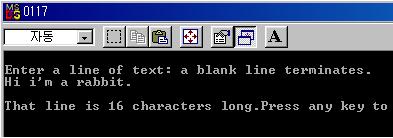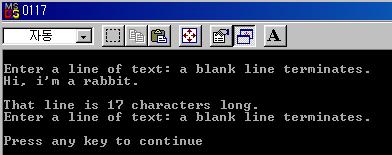<1> 사용자 정의 함수를 만들어 주기
1 : #include <stdio.h>
2 :
3 : int str_len(char *);
4 : void main(){
5 : char buf[20];
6 : puts("\nEnter a line of text: a blank line terminates.");
7 : gets(buf);
8 : int length = str_len(buf);
9 : printf("\nThat line is %u characters long.", length);
10 : }
11 : int str_len(char *p) //사용자 정의함수
12 : {
13 : int i = 0;
14 : while(p[i] != '\0'){ //문자열의 끝이 나올때까지 i 값을 증가시킨다.
15 : i++;
16 : }
17 : return i;
18 : }
< 결과화면 >

<2> "strlen"함수 사용하기
1 : #include <stdio.h>
2 : #include <string.h>
3 : void main(){
4 : size_t length;
5 : char buf[80];
6 : while(1)
7 : {
8 : puts("\nEnter a line of text: a blank line terminates.");
9 : gets(buf);
10 : length = strlen(buf); // 간단히 사용해주면 끝! <string.h>에 정의되어있는 함수이다.
11 : if(length !=0)
12 : printf("\nThat line is %u characters long.", length);
13 : else
14 : break;
15 : }
16 : }
< 결과화면 >

= strlen()에 전달되는 인수는 길이를 계산하기 원하는 문자열에 대한 포인터이다.
= 함수 strlen() 은 널 문자를 포함하지 않고 str에서부터 널 문자 사이에 있는 문자의 개수를 돌려준다.
'Backend > C' 카테고리의 다른 글
| 포인터(pointer)란 무엇인가? (0) | 2012.04.12 |
|---|---|
| Call by value & call by reference (0) | 2012.04.12 |
| argc, argv를 이용한 간단한 사칙연산. (0) | 2012.04.12 |
| strcpy()함수 (0) | 2012.04.12 |
| 파일을 여러 가지 모드로 열기 (0) | 2012.04.12 |